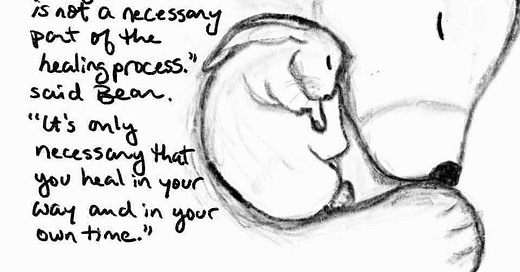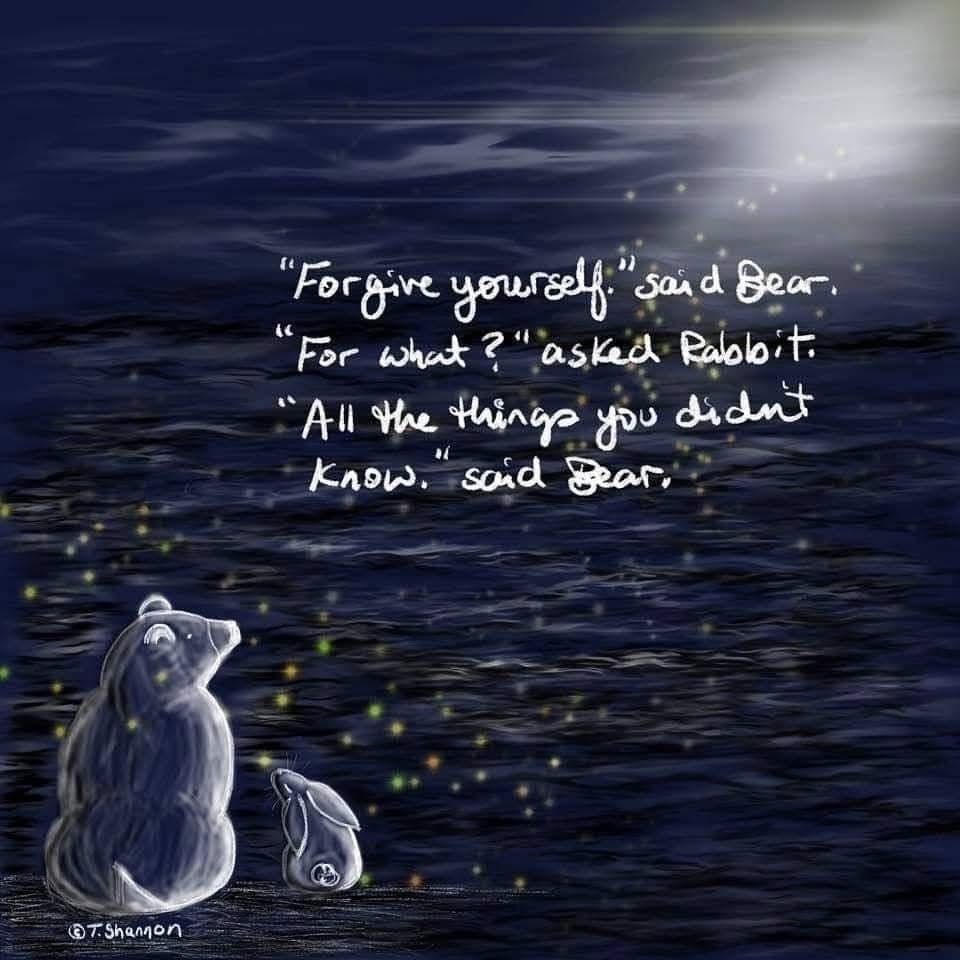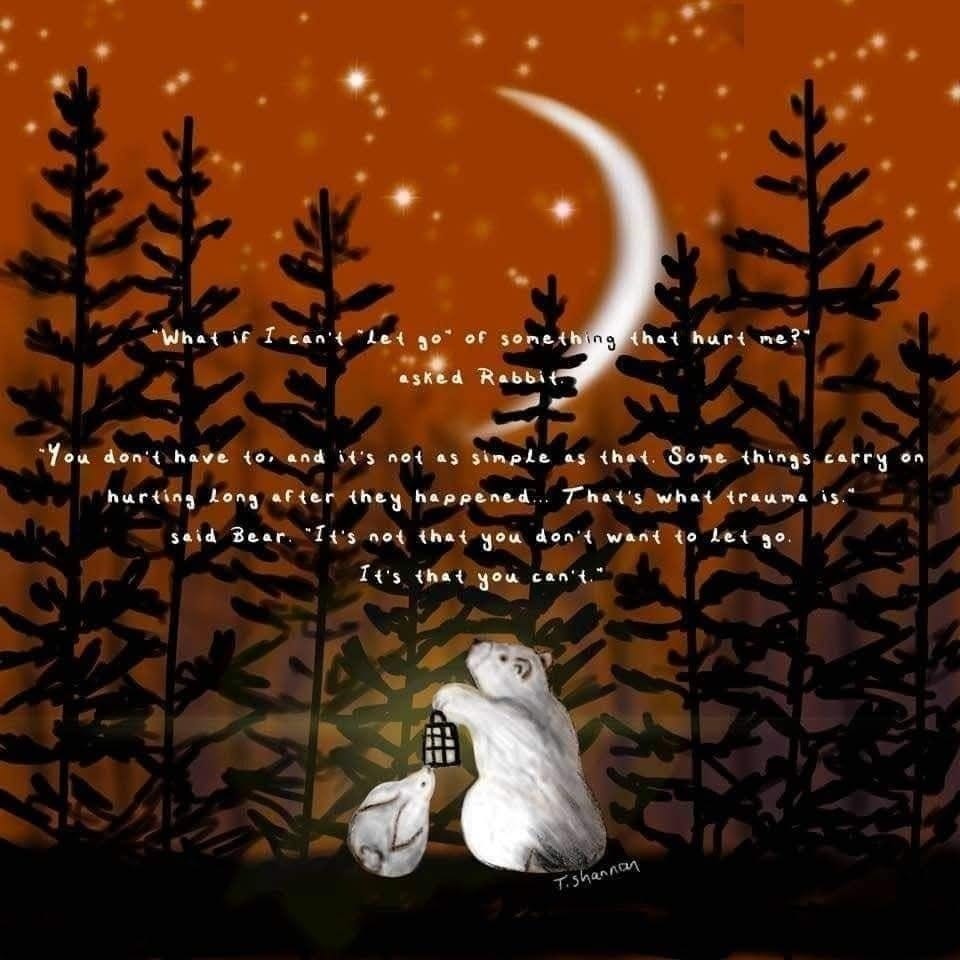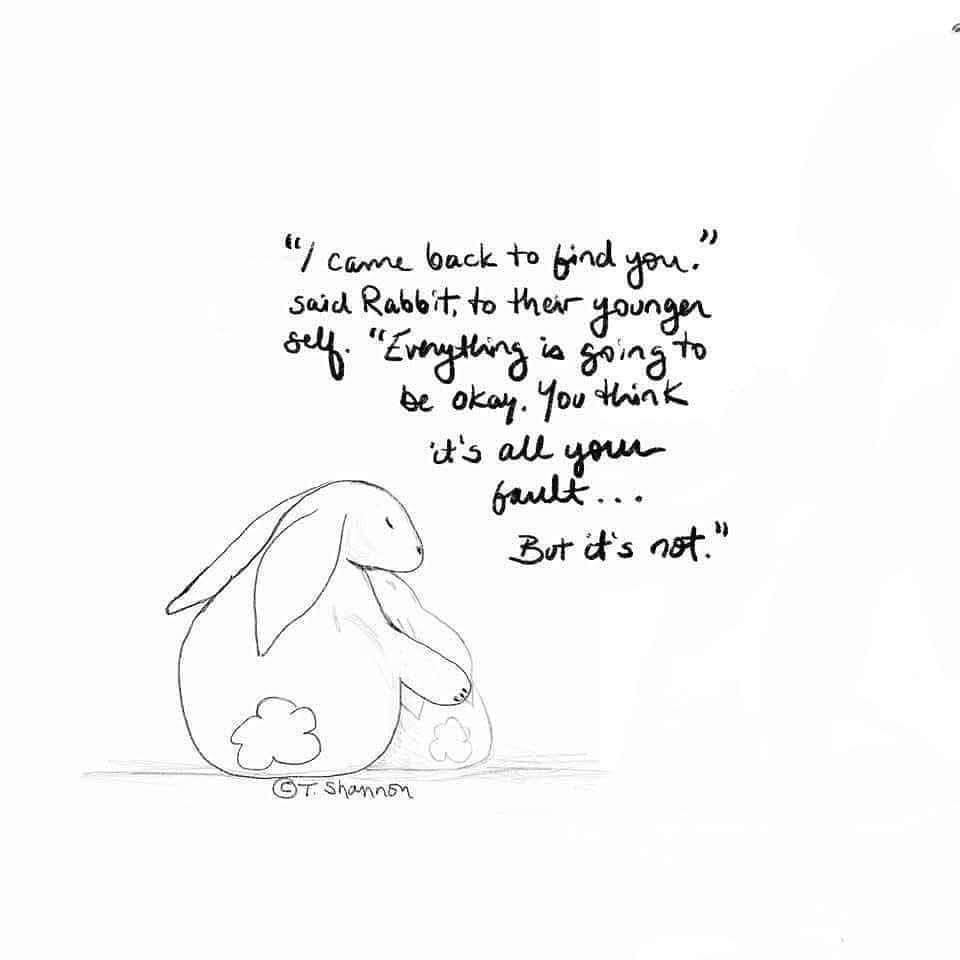Sometimes, when people talk about healing, they rush to mention forgiveness.
As if it’s a step you must take. As if without it, your pain has no closure.
But Bear sees things differently…
Image 1 Description:
A gentle sketch in pencil: Bear cradles Rabbit in a protective curl of their paw. Rabbit sits, eyes closed, holding their own arm—grieving, perhaps, or simply feeling.
The words beside them read:
“Forgiveness is not a necessary part of the healing process,” said Bear. “It’s only necessary that you heal in your way and in your own time.”
Sometimes, what we need most is not pressure to forgive, but permission not to. To feel what we feel. To honour our own pace. Healing isn’t linear—and forgiveness is not a prerequisite for wholeness.
Image 2 Description:
In a glowing nighttime scene by the water, Rabbit and Bear sit side by side under the moon. The stars reflect softly on the waves.
The dialogue reads:
“Forgive yourself,” said Bear.
“For what?” asked Rabbit.
“All the things you didn’t know,” said Bear.
There’s a different kind of forgiveness—one that whispers rather than demands. The kind you give yourself. Not because you failed, but because you were learning. Surviving. Doing the best you could with what you knew. That’s worth gentleness.
Image 3 Description:
Autumn leaves fall in a glowing forest as Rabbit offers Bear a lantern. They sit in quiet connection as the trees rise around them.
“True forgiveness is something you feel deep inside your soul,” said Bear. “If you don’t feel it there, you’re not ready to give it. And that’s okay. Forgiveness takes time and sometimes, that time never comes. And that’s okay too.”
Forgiveness can’t be forced. It must come from within—and if it doesn’t, that doesn't make you broken. It just makes you human.
Image 4 Description: Rabbit and Bear in a twilight forest
A dusky orange forest glows with stars as Rabbit and Bear sit beneath silhouetted trees and a crescent moon.
“What if I can’t ‘let go’ of something that hurt me?” asked Rabbit.
“You don’t have to,” said Bear. “It’s not that you don’t want to let go. It’s that you can’t.”
Trauma doesn’t obey logic. It lingers. And that doesn’t mean you’re weak—it means you’re still carrying what was too heavy to hold alone.
Image 5 Description Rabbit comforts their younger self
A pencil drawing of Rabbit gently placing a paw around a small, younger version of themselves.
“I came back to find you,” said Rabbit, to their younger self. “Everything is going to be okay. You think it’s all your fault… But it’s not.”
This, too, is part of healing: returning to the younger self inside you. Offering comfort. Undoing blame. Whispering what they needed to hear.
Maybe you’re not there yet. That’s okay.
Maybe you're not sure you ever will be. That’s okay too.
Bear and Rabbit would want you to know: you’re allowed to heal on your own terms.
You’re allowed to still be healing.
And you are not alone.
---
Together, these moments remind me—and maybe you too—that healing isn’t about ticking boxes or rushing emotions. It’s about listening to your heart. Holding space for your own becoming.
Whether you forgive, or not. Whether you’re still learning how.
Whether you need more time.
That’s okay.
Bear says so.
And I believe Bear.
✨️
I’ve shared this before, and I’ll continue to share it because it challenges a deeply ingrained belief: forgiveness is not necessary for healing.
Monsters—those who harm, abuse, and traumatize—want you to forgive. They want you to "let it go," to move on, because that lets them carry on as if nothing happened. They remain protected by the idea of forgiveness, often without consequence, cleared of wrongdoing, and free to repeat their actions. When forgiveness is pushed on victims, especially on children who may not even understand what it means, it doesn’t heal the victim—it protects the perpetrator.
Ask yourself: where and by whom is the concept of forgiveness most promoted? Who truly benefits from this expectation?
What some call forgiveness, I call acceptance. And acceptance was hard won. I don’t need to forgive the ones who hurt me, but I do need to accept what happened and, more importantly, accept and forgive myself. That’s where healing begins—for me, it’s how I’ve been able to move forward, through Rabbit & Bear, through years of therapy, through twists and turns I didn’t expect.
The idea of *forgive but don’t forget* has always felt like a contradiction to me. It feels like holding on to resentment. To truly forgive, in my mind, would mean to erase the harm as though it never happened—and for some of us, especially in cases of trauma, that’s not possible. But here’s the truth: it’s not necessary either.
Acceptance is enough. Forgive yourself, if you can, for the things you didn’t know, for the way you coped in the past—but beyond that, you don’t owe anyone forgiveness.
Let survivors of trauma and abuse find their own path to healing. Don’t push the notion that forgiveness is required for them to heal or not be "bitter."
Healing isn’t about satisfying the expectations of others; it’s about creating space for the survivor to feel, to grieve, and to speak their truth. If you can’t offer that safe, non-judgmental space, step aside and let someone who can.
Forgiveness is not the only way forward. Sometimes, it’s not the way forward at all.
Healing is about the victim’s journey—not yours. There are other ways to heal that may be even more profound than the act of forgiving someone who has harmed you. Acceptance of yourself, accepting that you survived, that you were not to blame, and forgiving yourself for what you didn’t know or couldn’t control—that is the healing that matters.
In the case of trauma, especially childhood trauma, the only one deserving of your forgiveness is you. You did the best you could with what you knew. It wasn’t your fault.
To anyone on this path—my heart is with you. Healing is yours to define, and acceptance might be the most powerful step you take. ❤️
P.S. I want to gently remind everyone that we all come from different backgrounds and beliefs, including religion or spirituality, and not everyone shares the same perspective. That’s perfectly okay. It’s important to be respectful of those differences, especially in spaces like this one, where people may be on very different journeys. Let’s continue to hold space for one another with kindness and understanding. ❤️
With love,
T.S. 🐇🐻❄️❤️✨️









So insightful into human relationships! Especially, Bear's notion that those who seek forgiveness are really seeking acceptance of their behavior.
Thank you and have a wonderful day.